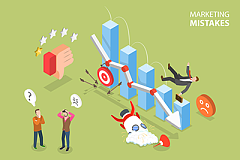 By now, it’s pretty obvious that 2019 was the year from hell for the American aerospace giant Boeing.
By now, it’s pretty obvious that 2019 was the year from hell for the American aerospace giant Boeing.
It all has to do with the disastrous rollout of the company’s upgraded mid-sized aircraft, the 737 MAX 8. Two crashes, one in late 2018 of an Indonesian Lion Air MAX 8, and another in March 2019 of an Ethiopian Airlines MAX 8, seem to have revealed various shortcomings related to the plane’s design and introduction into the market.
The aftermath for Boeing has numerous lessons for small business owners, and we’ve put together a list – in no particular order – of the most important of these.
1. Understand the Risks of Automation
One of the biggest trends in today’s business climate is automation. With AI and robotics becoming increasingly sophisticated, this is unlikely to change anytime soon.
This is true in the aerospace industry as well, and it’s one of the main reasons for Boeing’s current predicament. It’s suspected that the 737 MAX 8 crashes were at least partly the result of Boeing’s new Maneuvering Characteristics Augmentation System (MCAS).
MCAS is an automated anti-stall system, which was designed to minimize human input and error. It was yet another component of the overall automation trend in the airline industry, but it proved to be the MAX 8’s Achilles’ heel.
The MCAS may have worked as designed, but Boeing seemingly failed to adequately inform or train pilots in its use – and not all the automation in the world can overcome human error.
[quotesright]Every small business must understand the risks of adopting automation strategies and technology before taking that plunge.[/quotesright]
2. Keep Humans Involved
In keeping with the above point, it’s important to make sure that humans are always involved in every process.
Automation may be the wave of the future, but it’s unlikely to completely replace human input – at least in the near term. So, don’t ignore the human element.
Computers and automated systems have their parts to play, but they must be fully integrated with the humans who will use them.
3. Have a Good Crisis Management Plan in Place
[quotesright]Whether you’re a multinational mega-corporation, like Boeing, or just an everyday small business, a solid crisis management plan is a must. [/quotesright]
Especially for a large business, not having an adequate management strategy for the inevitable crisis is unacceptable. Eventually, something will go wrong, and when that happens, you need to be able to hit the ground running.
No business wants to think about a potential disaster of the magnitude of the Boeing crisis. But having an effective response at hand if the worst does happen could be the difference between a comeback or going out of business forever.
4. Cultivate Private-Public Partnerships
Some have speculated that the FAA’s unwillingness to take immediate action concerning the MAX 8 aircraft is evidence of a too-cozy relationship with Boeing.
Whether that’s true or not, the perception is very real, and the concerns are legitimate. Look, cooperation between the private and public sectors is inevitable, and it’s frequently a good thing.
But it’s also crucial to have a clear line of demarcation between the two. The idea is for the two to complement each other and streamline efficiency. But if the relationship becomes too intimate, it can be counterproductive.
Small businesses need to learn this lesson. By all means, cultivate fruitful partnerships with public partners where necessary.
[quotesright]But maintaining an appropriate aloofness is critical.[/quotesright]
5. Maintain Contingency Plans for Events Beyond Your Control
You might not always be responsible for the calamities that befall your business.
That’s just the way it is. In the MAX 8 example, Ethiopian Airlines and Lion Air were affected by decisions made at Boeing’s. In that sense, they were not responsible for the crashes.
Nevertheless, they will have to bear the brunt of the costs. Ultimately, an airline company is only as good as its airliners.
A good business owner will understand this and develop a contingency plan. Even if a crisis is not of your making, it’s crucial to have an emergency response at the ready.
6. Arrogance is a Weakness
Acting with unmerited swagger can lead to anyone’s downfall.
The key for every business leader is to recognize potential weaknesses and limitations and find ways to compensate. [quotesright]Behaving with unbridled arrogance will only lead to unforgivable errors in judgment, and this is where disasters happen.[/quotesright]
7. Don’t Rush a Bad Product to Market, Listen to Those Who Dissent
This one can’t be stressed enough. It appears that a big part of Boeing’s current predicament is that the Boeing leadership at the time put undue emphasis on making profits – and now they’re paying the price.
Apparently, Boeing put out a flawed product. Rather than investing the time, technology, and resources in developing a fully tested and vetted aircraft, it’s alleged that the company decided to cut corners.
The culture at Boeing at the time appears to have played a big part. The issues with MCAS were spotted early, brought to the attention of many levels of management only to be minimized and evidently not adequately resolved.
The dangers of a single point failure in the system’s sensors were noted early on by senior test pilots and engineers as a potential major safety issue. Their concerns were seemingly not adequately evaluated and a proposed second backup sensor was removed from consideration. In the haste to bring out the new 737 MAX, mistakes were made. More costly and time-consuming flight simulator training was replaced by using an iPad presentation on the system. Even including a simple warning light to alert pilots the MCAS had a problem was not mandatory.
Boeing seems to have influenced the FAA to certify the MAX 8 as nothing more than a modification to the original 737. This was enabled by a political climate that was highly favorable toward minimal interference in business by regulators. This perhaps caused the agency to co-opt its core mission of making our air travel safe, relegating it to secondary status. This meant that no new pilot simulator training was required to deal with a rare but predictable failure in the system, critical system designs were flawed but evaluated improperly and that has led to disaster.
[quotesright]The lessons for the small business owner are clear: Resist the urge to rush out an inferior product in hopes of short-term profit or create a culture where nothing matters but money and dissent is punished. The damage to your reputation will far outweigh any short term advantages.[/quotesright]
You’ll have to pay the piper eventually, and when you do, it could mean the downfall of everything you’ve worked so hard to build. It has sunk many a company, large and small.
8. Don’t Let Fear Rule Your Actions
This is closely related to the last point.
Ultimately, Boeing’s mistakes all stemmed from a very primitive human emotion: fear. Specifically, fear of its competitor, Airbus, which seemed poised to shut Boeing out of the mid-sized aircraft market.
And, fear leads to bad decisions. In this case, Boeing chose to place larger and more powerful engines on the old 737 airframe. But doing so required certain design changes, which altered the plane’s aerodynamics.
This, in turn, necessitated the development of the MCAS to compensate, which apparently has major flaws that were compounded by pilots who were ill-trained to handle a malfunction…and the rest is history.
Bottom line: Don’t let the fear of the competition dictate your actions. [quotesright]Focus on producing a quality product or service, and let your competition do all the worrying.[/quotesright]
9. Testing Isn’t Everything
Testing a new product can never be 100 percent effective… but at least test for unusual issues that are less likely to occur but which would be potentially catastrophic.
There will always be bugs in the system that will only appear through extensive use. Boeing undoubtedly put the 737 MAX 8 through its paces, but it failed to adequately assess the ability of an average pilot to deal with a malfunctioning MCAS, even though it should have been a key aspect of certification testing.
Don’t bias your testing. Small businesses must resist the temptation to use tests that do not prove their product’s reliability when used by ordinary users, not just experts.
10. Be Realistic
Another good idea to keep in mind is to maintain credibility by not over-promising.
From the beginning of the MAX 8 crisis, Boeing pushed a narrative that was, at best, overly optimistic. This only further damaged the company’s credibility, as it appeared that the leadership was out of touch with reality.
There was much talk of the MAX 8 being quickly fixed and readied for service – and this has proven not to be the case. Production of the aircraft is suspended, and it’s unclear if it will ever fly again.
[quotesright]Remember: Don’t over-promise and under-deliver. You’ll only suffer in the long run. [/quotesright]
11. Leaders Determine the Culture
[quotes]This is just a basic fact of human life. The leader sets the tone for the underlings.[/quotes]
If the top brass is domineering, intolerant of divergent opinions, and punishes or discourages dissent, the entire culture will suffer. Encourage employees to share their concerns and question business decisions that ought to be questioned.
Doing so just might be the key to saving a company from disaster – as Boeing learned to its cost.
12. Don’t Focus on One Stakeholder
This is another important lesson to be drawn from the Boeing crisis. The drawbacks of attending to only one stakeholder can ultimately prove to be disastrous.
For small business owners, this means focusing on the needs and concerns not only of customers, but of employees, suppliers, and communities as well. This is an investment in the future, and it builds a reserve of trust and goodwill that may just be what’s needed to see your company through troubled waters.
13. Don’t Forsake Company Values
A company ought to have a set of values that governs how it operates. And once established, these values must never be abandoned.
[quotesright]This is where Boeing ran into trouble. In its haste to outmaneuver the competition, the company seemingly abandoned its stated values of integrity and customer safety. [/quotesright]
The result was that it ended up valuing neither. Integrity degraded and the lack of an absolute commitment to customer safety had tragic consequences.
14. Some Things Are Beyond Human Control
Part of Boeing’s hubris was that it attempted to impose its will on complicated systems. Conforming to artificial timelines and economic considerations, the company appears to have traded reality for abstractions.
By making changes to the 737 that were dictated by economics, rather than engineering, Boeing ran up against the constraints of nature…and lost.
15. Accept That the Worst Can Happen
[quotes]There’s a temptation, inherent in every business owner, to think that nothing bad will happen to your company.[/quotes]
Don’t fall into that trap. It’s easy to think that you’d never make the same mistakes that Boeing made. But don’t kid yourself.
Indulge in a little honest self-criticism from time to time.
Small Business Owners Can Learn a Lot from Boeing’s Misfortunes
It may seem somewhat ridiculous to compare Boeing’s plight to the travails of small business owners. But mistakes are mistakes, whether committed by giant multinationals or small businesses.
Boeing's new leadership has taken on board the hard lessons learned from the 737 MAX 8 debacle. They are now busy rebuilding the culture to once again be fully committed to its core values; to listen to its engineers and others and rekindle the company's absolute adherence to safety and reliability. There are no shortcuts to excellence and a stellar reputation.
As a business owner yourself, you can benefit now, by knowing what not to do.














